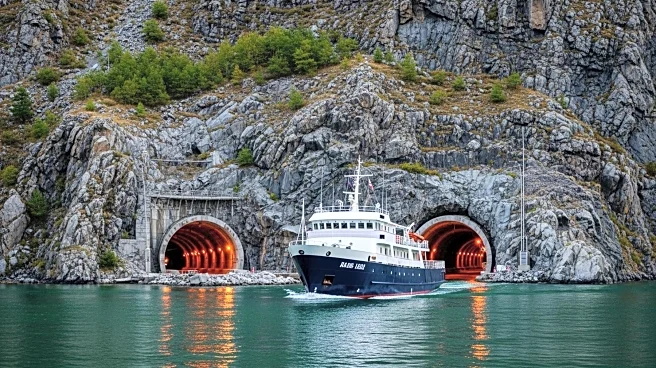What's Happening?
The Norwegian government has decided to withdraw funding for the construction of the world's first ship tunnel, citing excessive costs as the primary reason. Prime Minister Jonas Gahr Støre announced that the project, initially approved in 2021, has become too expensive to continue, with cost estimates rising from $325 million to approximately $930 million. The tunnel was intended to be built near Stad, a region known for challenging weather conditions, and would have facilitated safer and faster sea travel. Despite previous support, the government has prioritized other areas such as defense, health, and municipal finances in its upcoming budget. The Norwegian Coastal Authority had received construction bids and expected to start work in 2026, but the project's future is now uncertain.
Why It's Important?
The decision to halt funding for the ship tunnel project has significant implications for Norway's infrastructure development and maritime safety. The tunnel was seen as a critical project to improve safety in one of the most dangerous sea stretches along the Norwegian coast. Its cancellation may affect local businesses and maritime operations that anticipated reduced travel times and enhanced safety. Additionally, the withdrawal of funding reflects broader budgetary priorities, emphasizing defense and health over ambitious infrastructure projects. This shift may influence future government decisions and investments, potentially impacting economic growth and regional development.
What's Next?
Prime Minister Støre is set to present the new budget on October 8, which may spark debate in the Storting, Norway's parliament. Opposition parties and coalition members could challenge the decision, advocating for the project's continuation. Meanwhile, approximately $38.5 million has already been spent on feasibility studies and land purchases, raising questions about the project's sunk costs. Stakeholders, including 450 companies that previously supported the tunnel, may lobby for alternative funding solutions or adjustments to the project's scope to reduce costs.
Beyond the Headlines
The cancellation of the ship tunnel project highlights the complexities of balancing ambitious infrastructure projects with fiscal responsibility. It raises ethical considerations about government accountability in managing public funds and prioritizing projects that offer tangible benefits to society. The decision also underscores the challenges of executing large-scale engineering projects in regions with harsh environmental conditions, prompting discussions on sustainable and cost-effective solutions for future infrastructure endeavors.









